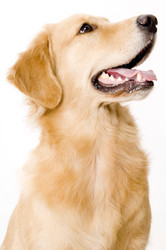How to Take Care of Your Dogs Teeth
Posted by Darren Walton on 25th Aug 2021
How to Take Care of Your Dogs Teeth
Oral hygiene is just as important for your pet as it is for you. Just the same as humans, if your dog’s teeth are not cleaned regularly, plaque will build up on the teeth and gums. Plaque is a type of bacteria which produce an acid which, over time eats into the surface of the teeth. This leads to the formation of painful tooth cavities as well as gum problems and ultimately can lead to tooth loss.
dog toothbrush and toothpastes available such as Virbac Enzymatic Toothpaste (formerly called CET toothpaste) which is available in a poultry flavour. It is important to use specialist toothpaste as these are safe for your pet if swallowed. Ideally you should start brushing your dogs’ teeth when they’re young so that they get used to it as part of their usual routine. However, it is never too late to start and most dogs will soon get used to the process. To help your dog get used to brushing, ideally build up over a few weeks.
- Get them used to having their mouth touched – gently rub their gums with a finger or soft cloth.
- Move on to using a brush that fits over a finger to get your dog used to tooth brushing.
- Let them taste the toothpaste so that they think of brushing as a treat not a chore.
- Once your dog is comfortable use a dog toothbrush – a long handle will enable you to reach all of the teeth.
Between brushing there are things that can be done to maintain your dogs’ oral health some of which require no effort at all on behalf of the owner.
- 1.There are a number of toys available designed specifically to help keep teeth clean; Kong dental sticks, Nylabone dental bones etc.
- 2.Dental chews such as Veggie Dent Fresh , though you must be careful not to allow too many of these to prevent weight gain.
- 3.There are a number of specialist diets available to help with your dogs oral care though these should be used only on the advice of your veterinary surgeon.
- 4.Supplements such as Plaque Off can be added to food to help reduce plaque build up. Alternatively there are drinking water additives such as Vet Aquadent or Novodent Solution which also help maintain your dogs oral health between brushing.
Bad Breath
If you notice that your dog’s breath is smellier than usual this may just be an indication that you need to introduce a regular brushing routine. However, smelly breath can be an indication of more serious underlying problems which may need investigation by your vet. These include dental disease such as rotten teeth or gum infections – brushing in this case may be detrimental and the issue will require veterinary intervention. There may be something stuck in the teeth or gums and the bacteria build up is causing the bad smell. Kidney disease can leave the breath smelling of ammonia which is not being effectively filtered by the kidneys. Similarly sweet or fruity smelling breath may indicate diabetes as they struggle to control the sugar levels in the blood. Once these underlying conditions are ruled out then you can begin a regular dental hygiene program.
Dental Disease
Warning signs that your dog is suffering from serious dental disease include; constant bad breath, yellow/brown staining on their teeth, difficulty eating, food dropping from their mouth, red or bleeding gums, weight loss, face rubbing or dribbling. If your dog is showing any of these signs you should consult your veterinary surgeon. By following a regimented oral hygiene routine you will help prevent these problems from becoming established and enable you pet to enjoy a happy and healthy life.

